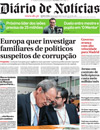
“Europe wants to investigate the relatives of politicians suspected of corruption,” headlines Diário de Notícias, as the European Commission unveiled a plan to fight money laundering, corruption and drug trafficking. The directive aims to expand monitoring of "politically exposed persons" who may be corrupted by terrorist financing networks and money laundering syndicates. According to the Lisbon daily –
The new policies put heads of state, ministers, MPs and judges in the crosshairs concerning the fight against organised crime. […] The investigations will target the closest family members and associates of people with positions which make them politically exposed […] and also personnel from international organisations.
The proposal also sets some sanctions, according to the EUobserver –
Individual staff may be fined up to €5m and firms such as banks may be fined 10 per cent of turnover if they flout anti-money laundering rules. […] Other proposed sanctions against rule breakers include withdrawal of bank licences if a bank is involved, banning executives from holding board seats and public naming and shaming.
In order to limit cases of corruption and money laundering, the directive requires banks and other financial operators to follow onerous monitoring procedures, details Spanish business daily Expansión -
They must conduct an audit of their clients, maintain records, and carry out internal inquiries, archiving any suspicious transactions. The directive also affects lawyers, notaries, accountants, property agents and casinos. In addition, these agents must have procedures to determine whether the client is actually the person involved in the transaction, and, in case of ‘riskier business relationships’, ask management permission to determine the source of funds related to the transaction, plus arranging additional monitoring of the business relationship.
The proposal comes at a difficult moment for Spanish Prime minister Mariano Rajoy, adds Expansión –
after dailies El Mundo and El País revealed that his Popular Party’s top managers received ‘extra’ salaries that might have been coming partially from ‘illegal money’.
Do you like our work?
Help multilingual European journalism to thrive, without ads or paywalls. Your one-off or regular support will keep our newsroom independent. Thank you!















